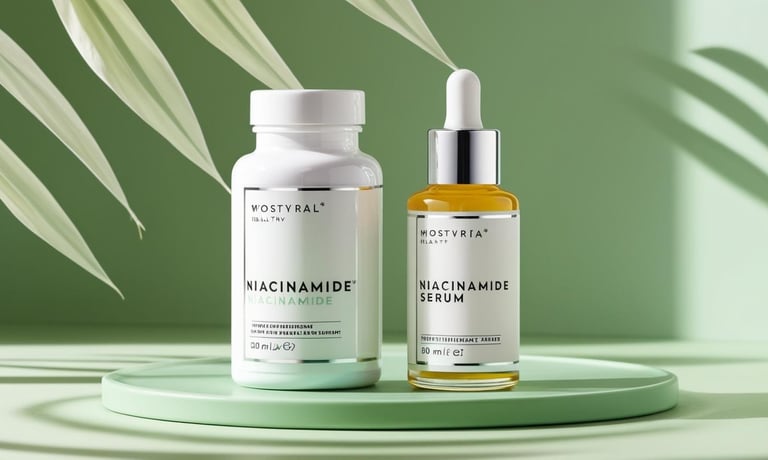Niacinamide: The Science-Backed Powerhouse for Skin and Health
HEALTH & WELLNESS
By Sia Imime
3/29/20253 min read


Disclosure: This article contains affiliate links, meaning that if you purchase through them, I may earn a small commission at no extra cost to you. I only recommend products that I believe will add value to your personal growth journey.
Niacinamide, also known as nicotinamide, is a form of vitamin B3 that has gained immense popularity in skincare and health. Backed by scientific research, it offers a range of benefits when used topically as a serum and taken as a dietary supplement. From improving skin texture to boosting brain function, niacinamide is a must-have nutrient in your wellness routine. In this guide, we will explore its benefits, sources, and best products to incorporate into your daily life.
1. What is Niacinamide?
Niacinamide is a water-soluble vitamin that plays a crucial role in energy metabolism and cellular repair. Unlike niacin, another form of vitamin B3, niacinamide does not cause flushing and is widely used in skincare and supplements.
🔹 Study Reference: A study published in the Journal of Clinical and Aesthetic Dermatology (2010) found that niacinamide significantly improves skin elasticity, hydration, and barrier function (source).
💡 Recommended Product: Pure Niacinamide Powder Supplement
2. Benefits of Niacinamide for Skin
A. Reduces Acne and Inflammation
Niacinamide has anti-inflammatory properties that help reduce acne, redness, and irritation.
A 2013 study in the International Journal of Dermatology found that a 4% niacinamide gel was as effective as 1% clindamycin in treating acne (source).
💡 Recommended Product: Niacinamide 10% + Zinc 1% Serum
B. Improves Skin Hydration and Strengthens Barrier
Niacinamide enhances ceramide production, which helps retain moisture and strengthens the skin barrier.
A study published in Dermatologic Surgery (2005) found that topical niacinamide significantly reduced transepidermal water loss and improved skin hydration (source).
💡 Recommended Product: Niacinamide + Hyaluronic Acid Hydration Serum
C. Fades Hyperpigmentation and Dark Spots
Niacinamide inhibits melanin transfer, reducing dark spots and uneven skin tone.
A British Journal of Dermatology (2002) study found that 5% niacinamide significantly reduced hyperpigmentation in 12 weeks (source).
💡 Recommended Product: Brightening Niacinamide Serum with Vitamin C
3. Niacinamide as a Dietary Supplement
A. Supports Brain Function
Niacinamide plays a key role in brain health by supporting mitochondrial function.
A Neurobiology of Aging (2013) study found that niacinamide supplementation improved cognitive function in Alzheimer's patients (source).
💡 Recommended Product: Niacinamide Brain Support Capsules
B. Boosts Energy and Reduces Fatigue
Niacinamide is essential for ATP production, which fuels energy metabolism.
A Journal of Nutritional Biochemistry (2016) study linked vitamin B3 intake with reduced fatigue and improved muscle performance (source).
C. Promotes Heart Health
Niacinamide helps lower oxidative stress and supports cholesterol metabolism.
A Circulation (2019) study suggested that vitamin B3 supplementation can reduce LDL cholesterol and increase HDL levels (source).
4. Natural Sources of Niacinamide
While supplements are convenient, you can also obtain niacinamide through a balanced diet:
Animal Sources: Chicken breast, tuna, turkey, beef liver, eggs
Plant Sources: Brown rice, peanuts, mushrooms, avocados, sunflower seeds
Fortified Foods: Breakfast cereals, whole-grain bread, dairy products
5. How to Incorporate Niacinamide into Your Routine
A. Topical Use in Skincare
Apply a niacinamide serum after cleansing and before moisturizing.
Use in both morning and evening routines for optimal results.
Pair with sunscreen during the day to prevent UV damage.
B. Oral Supplementation
Take niacinamide supplements with food to improve absorption.
Stick to the recommended daily dose: 16 mg per day for adult men and 14 mg per day for adult women.
Higher doses (100 mg to 1,000 mg per day) may be used for therapeutic purposes under medical supervision.
Final Thoughts
Niacinamide is a scientifically proven powerhouse that benefits both skin and overall health. Whether applied as a serum or taken as a supplement, it plays a crucial role in reducing inflammation, boosting hydration, and enhancing cognitive function. By incorporating niacinamide into your daily routine, you can achieve glowing skin, better brain function, and improved energy levels.
Which form of niacinamide are you most interested in—skincare or supplements?
Tags: niacinamide benefits, vitamin B3 skincare, niacinamide serum, skin barrier repair, anti-inflammatory skincare, fade dark spots, brain health supplement, energy metabolism, niacinamide for acne, glow-up ingredients, cognitive support vitamins, hyperpigmentation treatment, skincare routine tips, holistic wellness, anti-aging skincare
